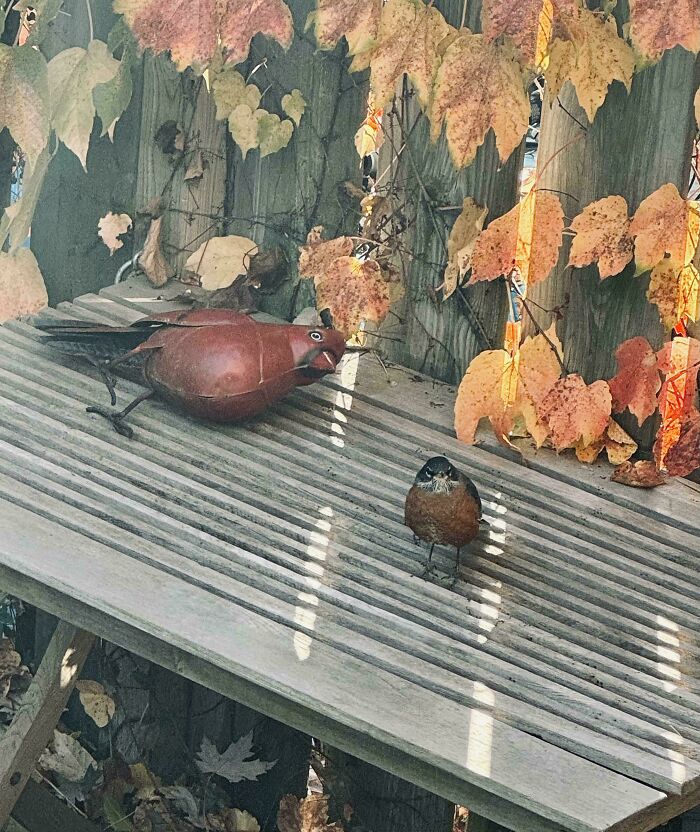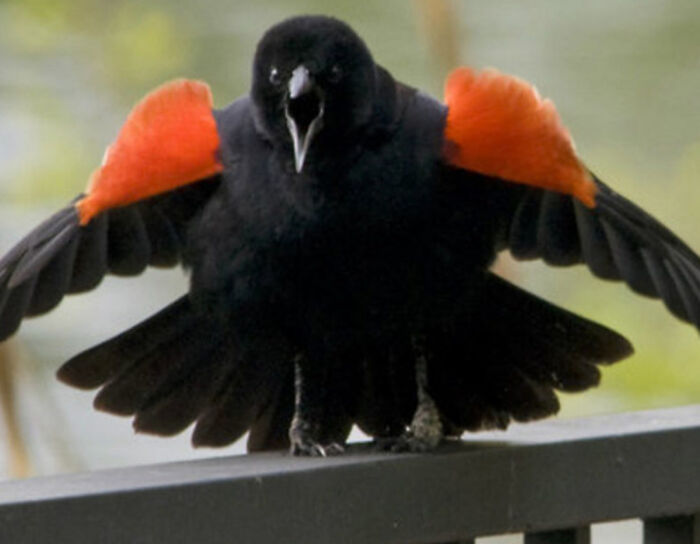When you look at a bird soaring through the air, what do you see? A wholesome little creature that comes with peace or someone that has this unexplainable urge for chaos and menace inside? If you’ve been pooped on by a bird or had it steal your food, you’re probably thinking of the latter option. Our feathered friends, just like humans, can be a bit nitwitted, and the proof is in the Birds Being [Jerks] subreddit.
We at Bored Panda have collected some of the best (worst?) evidence of birds causing menace to society. To find it, all you have to do is scroll down. While you’re busy doing so, don’t forget to upvote those chirpers you would feel intimidated by in the street.
Also, we reached out to birders and hosts of the Hannah and Erik Go Birding Podcast, Hannah and Erik, and Isabelle Manseau, owner of Birdzy, who kindly agreed to tell us more about the mean behaviors of avians.
Birders and hosts of the Hannah and Erik Go Birding Podcast, Hannah and Erik are a husband-and-wife duo who spend their free time exploring, crossing birds off their list, and traveling to new places. The couple started their podcast to hopefully inspire others, share their adventures, and encourage future and present birders.
Hannah and Erik tell Bored Panda that they have noticed quite a few species exhibiting “jerk-like” behaviors in their time birdwatching.
“One species that comes to mind is the Northern Mockingbird, a fairly common bird throughout much of the US, Mexico, and the Caribbean. These birds become very territorial during the breeding season and drive off potential threats and competitors. We’ve even seen two individuals fighting in the road, almost as if to push one another in front of a car!” they share.
Isabelle Manseau, owner of Birdzy, agrees that birds can exhibit behaviors that humans can interpret as “jerk-like” or chaotic. “One of the most chaotic examples is the behavior of seagulls in coastal areas. They are notorious for their bold food-stealing antics, often snatching food directly from people’s hands or even swooping down to steal snacks from outdoor tables,” she told us.
“Another example is the common grackle, which forms large, noisy flocks that can dominate bird feeders, pushing out smaller birds and creating a lot of commotion. Additionally, blue jays are known for their aggressive behavior at feeders, often scaring away other birds and even mimicking hawk calls to clear the area for themselves.”
Isabelle’s creation, Birdzy, offers handmade bird food that is packed with high-energy food, rich in protein and fat. “I quickly realized that the store-bought seed was like junk food for birds and I wanted to provide a better dining experience,” she wrote on her website.
“As I created and refined my blends and created handmade birdseed gifts, I found myself drawn into a vibrant community of bird enthusiasts. We shared tips, stories, and lots of laughter. The positive feedback and happiness from the community and customers only fueled my passion further.
In general, Hannah and Erik say that corvids, like crows and jays, are more susceptible to acting (in human terms) mean because they have a higher intelligence than a lot of other birds.
“This helps them adapt and thrive in harsh environments. Sometimes this causes them to be a bit mischievous. For example, jays are incredible mimics and will often mimic the call of a raptor, which confuses smaller birds (and sometimes birders). They use this to scare all the little birds away from feeders so they can have it to themselves.”
“Certain bird species are more likely to display behaviors that humans might perceive as mean,” seconds Isabelle.
“European starlings are invasive in many regions and frequently outcompete native birds for nesting sites and food, which can come across as aggressive or unfair. House sparrows are known for their aggressive behavior at bird feeders, often chasing away other birds to monopolize resources. Red-winged blackbirds are fiercely territorial during breeding season and will aggressively dive-bomb anything that comes near their nests, including humans and larger animals.”
However, such birds aren’t acting like “jerks” on purpose, Hannah and Erik tell us. “The goal for animals is to survive and pass their genes on. So any actions that might be considered mean or “jerk-like” are likely helping that bird to fulfill this purpose. Some birds tend to have more attitude than others, which could help them protect their territory, find mates, or chase off predators.”
“Birds don’t have the same emotional complexity as humans, so they aren’t “mean” in the way we understand it,” adds Isabelle. “However, their behaviors are often driven by survival instincts, such as securing food, defending territory, or protecting their young. For example, a bird stealing food from another bird isn’t being “mean” on purpose—it’s simply trying to survive.”
A robin just knocked over a metal bird we keep on the table outside, then stared me down asking me what I was going to do about it.
“If you see a bird doing something “mean,” watch it for a while and put yourself in its shoes to see if you can figure out its motivations,” Hannah and Erik suggest.
Meanwhile, Isabelle says, “Understanding the motivations behind bird behavior can help reframe these actions as natural and necessary for their survival, rather than labeling them as “mean” or “jerks.””
Anyone else in Milwaukee, have one of these asshole birds attacking you every time you leave through your front door?
One of these red tip black birds, decided to post up right on the top of my house overlooking anyone who walks out my front door and flying into their head; at one point it caused an accident where it hit someone in the back of the head which caused them to trip down the stairs, scraped up knees, scraped up forehead and hands.
[ad_2]
Source link








